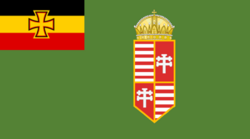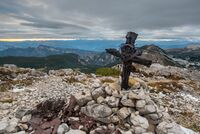Krenyan-Lyonheimer: Difference between revisions
Lyooonheimer (talk | contribs) No edit summary |
Lyooonheimer (talk | contribs) No edit summary |
||
| Line 60: | Line 60: | ||
|image_map2_alt = | |image_map2_alt = | ||
|image_map2_caption = | |image_map2_caption = | ||
|capital = | |capital = [[Judapest]] | ||
|capital_exile = <!-- If status="Exile" --> | |capital_exile = <!-- If status="Exile" --> | ||
|national_motto = | |national_motto = | ||
|national_anthem = | |national_anthem = | ||
|common_languages = | |common_languages = [[Hungarian (Anteria)|Hungarian]] | ||
|religion = | |religion = | ||
|demonym = | |demonym = | ||
|currency = | |currency = Krenen | ||
<!-- Titles and names of the first and last leaders and their deputies --> | <!-- Titles and names of the first and last leaders and their deputies --> | ||
|leader1 = [[King Stephen III]] | |leader1 = [[King Stephen III]] | ||
Revision as of 19:24, 30 April 2021
Krenyan-Lyonheimer Empire Krenyan-Lyonheimer | |||||||||
|---|---|---|---|---|---|---|---|---|---|
| 1904–1911 | |||||||||
 Flag | |||||||||
| Status | Annexed by Lyonheimer & The Alliance | ||||||||
| Capital | Judapest | ||||||||
| Common languages | Hungarian | ||||||||
| Historical era | Great War (1905-1920) | ||||||||
• Just Before the start of the Great War | April 16th 1904 | ||||||||
• End of the Great War | 11th November 1911 | ||||||||
| Currency | Krenen | ||||||||
| |||||||||
| Today part of | |||||||||
| |||||||||
Krenyan-Lyonheimer, although technically an independent state, was a puppet of Krenya during the Great War from 1905 to 1911. The nation currently where Lyonheimer is, was annexed by the Alliance following the end of the war. Created by Krenya upon realisation of expensive materials in the region, it became a puppet state in 1905 while on the brink of war with Blechingia, as Krenya saw it as a strategic position, however didn't want to have to pay for the fees to keep the nation so made King Stephen III the de-facto leader of the nation.
Military History
Here are the following weapons used during the war by the Krenyan-Lyonheimer military

History
Krenya declared that East Blekinge was no-more, and decided to rename it the Krenyan-Lyonheimer Empire. the Grand-Duke signed the declaration for the nation, and it became a puppet state of Krenya 'run' by the monarch who previously had no power. Krenya only really had this idea as they noticed a large amount of expensive metals in the region.
They remained in this state until 1905, the year beginning the Great War, where officials from Krenya sent a written telegram to Judapest which stated that they must prepare to go to war with Blechingia and the alliance.
At the beginning of the war, the attitude of the people was upset, yet patriotic, as many Lyonheimerish people had family and friends in Blechinigia, which upset a lot of people. However, many joined the war anyway, seeing it as an adventure of a lifetime, due to the fact none had experienced anything quite like it before. A document from the military at the time suggests as many as 800,000 men signed up to join the military in 1905, on the brink of war. With little to no training, men were sent to fight on the Southern Front.
The conditions that the soldiers were living in was awful. Krenyan and Lyonheimerish soldiers lived in trenches for months on end, fighting the Blechingians in the mountains without making much progress.
The trenches spread for miles, from the Bay of Asta to the Medovian border in the north. The fighting was often brutal, with lands in-between the two trenches being covered in landmines, barbed wire and gunfire. The living conditions were often very bad too, as soldiers were living for months on end in the open, without sleeping bags and often on the ground. The weather in the Lübbenau Mountains is often snowy and because of this many died of hypothermia if they lost their coats that they were originally given at the beginning of the conflict. When it snowed, soldiers would often gather round small fires built with any sticks and lumber spare. Soldiers would be fined or scolded if their rifles or boots were too muddy, as officer were often strict to keep order. Soldiers would have one radio per kilometre. The radio would play messages from the King and Grand Duke as well as lists of casualties per day. Occasionally, Alliance planes would go overhead, in which case soldiers would take cover and were told to cover their necks with their hands. The conditions were awful on the Southern Front during this point of the war, with little advancement either way.
Following the War, the Alliance was coming up with punishments to deter former Iron-Pact nations from doing anything similar again. The punishment for Krenyan-Lyonheimer was annexation and separation from Krenya, becoming Lyonheimer in 1911

